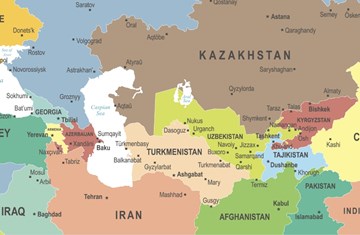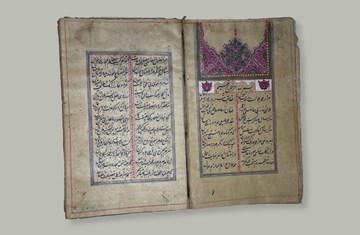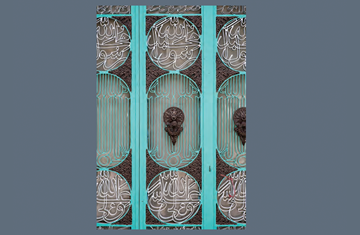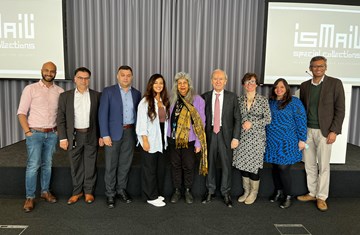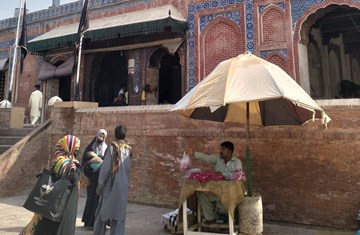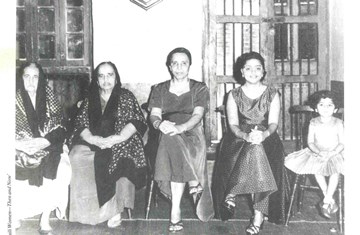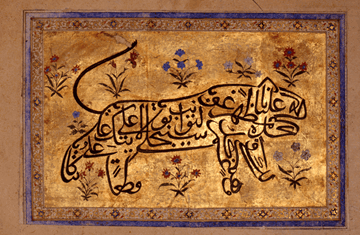GPISH Students Deliver Field Research Presentations
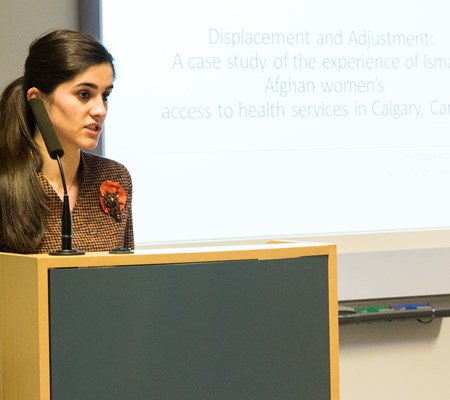
On 18 and 22 January, the Department of Graduate Studies welcomed back third-year students on the Graduate Programme in Islamic Studies and Humanities (GPISH), who presented their fieldtrip research papers. The topics of their research reflected their broad and diverse interests in the social sciences and humanities, and the presentations led to stimulating discussions with audiences composed of academic staff and students. The research had been conducted in different parts of the world, which gave the presentations an international reach and relevance that several audience members complimented.
GPISH students spend two years in London at the IIS on a Masters-level course in Islamic Studies and Humanities that adopts a fundamentally interdisciplinary approach to the study of Islamic civilisations. This programme aims to prepare them for embarking on a Master’s degree, primarily at a British university, and the field research they conduct during the summer after their second year represents the culmination of this preparation. Students choose topics of interest to themselves which are also consonant with the scope and mission of the IIS.
Several presenters remarked that the field research and subsequent writing-up contributed directly to their formation as thinkers and researchers, with particular reference to their current Masters degrees. One of the students spoke of how their methodological discipline was enhanced by the research preparation in their second year and the experience of fieldwork thereafter. Another commented on how returning to present their research was an apt conclusion to the process that was also formative in itself.
A current second-year student who is yet to embark on field research commented that attending the third-year presentations will help them to finalise the planning of their own fieldtrips and has given them further methodological insights that will guide them over the coming months.
Commenting on the value of the research projects, Christie Johnson, GPISH Programme Leader said:
As the GPISH Programme Leader, I was impressed with the diversity of topics and approaches, which ranged from attitudes to teaching and learning to questions of negotiating identity in various contexts; there were perspectives on several issues of international development and also historical and sociological studies. It was easy to see how the students’ research efforts will stand them in very good stead for serious and thoughtful, relevant work in the future. And from a practical standpoint, the experience of presenting to peers, students and academics in order to disseminate their findings was an excellent platform for working on their communication and engagement skills.
The research titles of projects include:
| STUDENT | Country | Research Project | Third Year Degree and University |
|---|---|---|---|
| Amaan Merali | Canada | Between the Sea and the Desert: The Historiographical Implications of Ismaili Repopulation of Salamīyya in Late Ottoman Syria | MA Turkish Studies, SOAS |
| Arsalan Baig | Pakistan | Perceptions of Ismaili Seniors with regard to Community Support, Toronto | MSc Social Policy and Development, London School of Hygiene and Tropical Medicine |
| Ayman Fattoum | Syria | Reasons for Immigration and Challenges of Refugees’ Settlement: A Case Study of the Syrian Ismaili Refugees in Sweden | MSc in Development Administration and Planning, University College London |
| Difaf Sharba | Syria | Muslim Conversion Out of Islam in the MENA: Motivation & Representation | Master Public Policy (MPP), Oxford University |
| Farzona Noyobshoeva | Tajikistan | Displacement and Adjustment: A case study of the experience of the Ismaili Afghan women's access to health services in Calgary, Canada | MSc Public Health, London School of Hygiene and Tropical Medicine |
| Karim Virani | Canada | Promoting a Politics of Engagement: Seven Muslims in Ottawa and their responses to the events of October 2014, the Prime Minister's call to condemn 'Islamic terrorism' and on being Muslim in Canada today | Global PMA, New York University and University College London |
| Muhammad Arbab Jahanzeb | Pakistan | Landscape of Fear: The Perception of ‘Security Measures’ and People’s Freedom of Movement within a City | MSc in Conservation of Historic Buildings, University of Bath |
| Rasool Daya | UK | Time and Knowledge: Human Agency In Action | Master of Liberal Arts, University of Pennsylvania |
| Rizwan Karim | Pakistan | NGO-Government Relationship in Gilgit-Baltistan: Employee Perceptions of Adolescent Early Youth Development Programme (AEYDP), a rights-based project by the Aga Khan Rural Support Programme | MSc Development Administration and Planning, University College London |
| Sumera Salim | Pakistan | Canadian Ismaili Youth of Afghanistan Origin and their Post-Secondary Career Choices in Alberta (Canada): A Qualitative Exploratory Analysis | MSc Development Administration and Planning, University College London |
| Ummekulsoom Lalani | USA | Blended Learning: A Case Study of Nursing Students' Perceptions at Aga Khan University, School of Nursing and Midwifery | Master Public Policy, University of Cambridge |
| ZahirShah | Pakistan | Journey of a civil society organisation: Gulmit Educational and Social Welfare Society (GESWS) from theory to practice | MA Globalisation Business & Development, University of Sussex |



